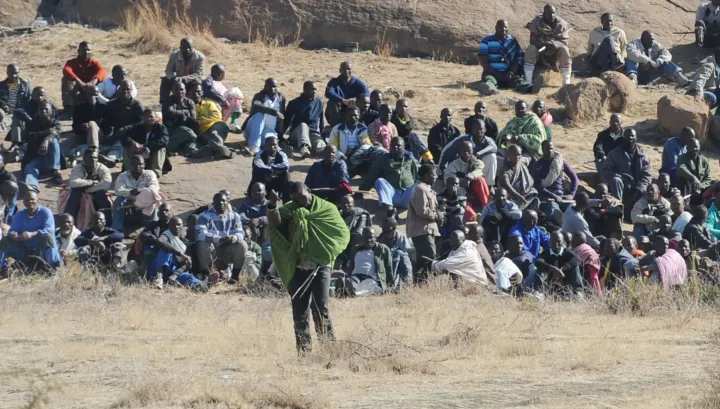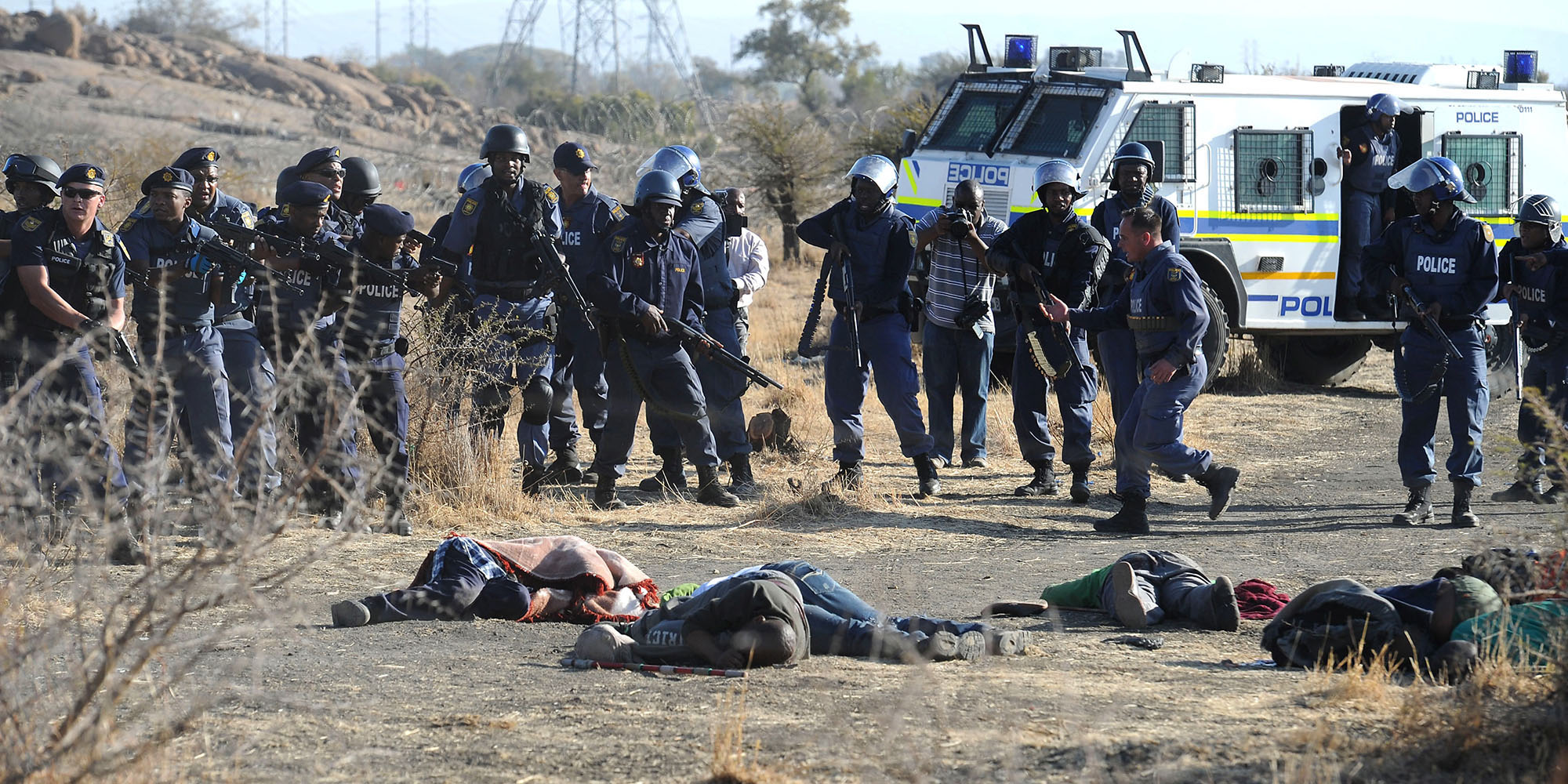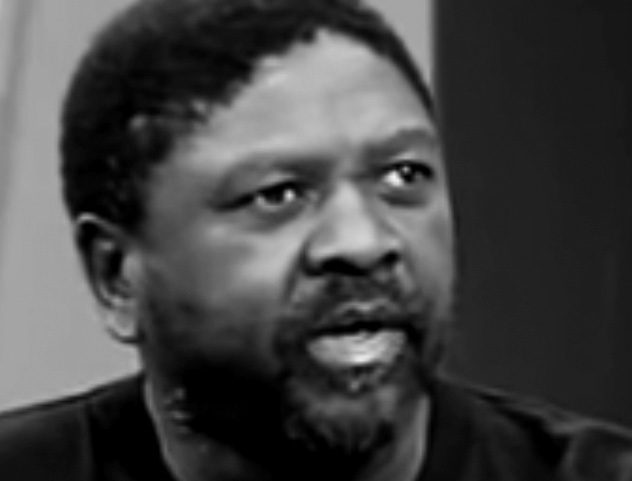TRIBUTE
A revolutionary life: Oupa Lehulere was an organic intellectual and a visionary dissident

The state massacre of workers at Marikana was for Oupa Lehulere a turning point. It signalled the demise of the old anti-apartheid movement as a moral force. The forging of a new movement would require a whole new historical phase and new intellectual tools for such a movement to have its own identity and voice. And he set out to do precisely that...
“Homo sum, humani nihil a me alienum puto, — I am human, and I think nothing human is alien to me: Terence (ex-African Slave turned Roman playwright, circa 160BC)
Oupa Lehulere, director of Khanya College, lifelong activist, public intellectual and Marxist revolutionary has just died at the age of 61 in Johannesburg after a battle with cancer.
Over a period of 45 years — spanning both the apartheid and post-apartheid eras — Oupa has been one of South Africa’s most outstanding intellectual forces at the centre of, and giving guidance to, the youth struggles of the 1970s and 1980s, the labour movement of the 1990s and the social movements of the 21st century.
Devastating polemical put-downs, short commentaries, long analytical papers that were guides to action… Oupa’s writings spanned them all.
He combined these with programmes of discussion with networks of activists and education programmes with workers at the SA Committee for Higher Education (Sached) and Khanya. He repudiated the idea that “theory” was the sole prerogative of the academy and instead epitomised Marx’s 11th thesis on Feuerbach: “Philosophers have only attempted to understand as it is. Our job is to change it.”
Born in Gugulethu, Cape Town in 1960, Oupa as a student at Fezeka High led the 1976 uprising in Cape Town (which only started in August of that year). He was also a leader of the Committee of 81, which coordinated the joint boycotts of African and “coloured” schools in 1980. Thereafter he helped form the Lagunyacro (a contraction of Langa, Gugulethu, Nyanga and Crossroads) youth movement and the Western Cape Youth League. Oupa left Cape Town in 1990 for Durban where he joined Sached (Durban), while writing a weekly educational series in the Learning Nation in Johannesburg before taking over Khanya College in Johannesburg in 1998.
Over all this time, Oupa was part of a socialist current in Cosatu and in the youth and community struggles who fought to ensure that struggles for democracy and national liberation were fused with struggles against capitalism. Not because of some mere ideological dogma but because, as has subsequently been painfully demonstrated, apartheid and capitalism were inextricably linked.
It is the ANC’s acceptance that development and democracy required a competitive capitalism that is the basis for its subservience to the old apartheid oligarchs. It is capitalism’s shift to neo-liberalism that accounts for the rampant corruption and privatisation and the decline of democracy that is South Africa today.
As the apartheid regime of FW de Klerk (who also died in 2021) began the open negotiations of 1990 (we now know that regime-ANC secret talks long preceded 1990) which ushered in the transition, Oupa wrote detailed studies of these negotiations and their relations to the state of play of national struggles on the ground to provide strategic guidance to activists.
It is one of the abiding myths of the current moment that the outcomes of these negotiations were the best possible. Liberal commentators salute the post-1994 constitutional order and lay claim to have been the guiding influences. At the same time the ANC would have us believe, simultaneously, that it both won the negotiations battle and that its hands are tied in any attempts to deal with the outstanding apartheid questions: the national question, the land question, the limited nature of our democracy and public accountability. That the only alternative to the elite pact was more bloodshed and chaos.
Oupa’s writings on these questions give a different interpretation and give us perspectives, even now, of what may be done.
In papers such as The Dream Corrupted and the Long Reach of De Klerk Oupa critiqued South Africa’s transition. For him, critique meant not so much debunking the arguments of those who merely worship the current order as an accomplished fact but showing how and why such views should be dominant today.
In South Africa, not 30 years have passed since what appeared to be the achievements of winning the right to vote and yet, today in 2021, nearly two-thirds of eligible South Africans find the political class so corrupt and dysfunctional that they do not vote or (in the case of young people) bother to register. The erstwhile liberation movement of the ANC and its Cosatu and SACP allies has become a disgraced BEE “front” for South Africa’s oligarchs of white monopoly capital.
In the midst of the Covid-19 pandemic and the worst health crisis of the last 100 years, an ANC government cuts the health budget and maintains the elite political project of austerity and privatisation, with the commentariat as its praise-singers.
In long papers over 2020 and 2021, Oupa excoriated the Ramaphosa government for its responses that amounted to the abandonment of the poor. And, in Scientists against the Science, he did not spare the health academics as they buckled under government and business pressures to prematurely lift the lockdowns to “save the economy”. (In this he was not alone as Lancet editor, Richard Horton, who also has cancer, did the same to the British science establishment).
It is notable that, today, as the liberation veterans age and begin to publish biographies and reflections, how many times they need either the hand of sympathetic liberals or academics to do so on their behalf. And how much middle-class academics are the publishers of works on the “visionary humanity” of the Tambos, the Mandelas etc.
Much has been made by liberal commentators, liberation veterans and even some on the Left of the apparent “immediatism”, impatience and “lack of strategic sense” of the student youth of the 2015 uprisings.
But when the Fees-Must-Fall generation raised the flag of decolonising the curriculum, there were no inspiring texts from ANC or SACP liberation icons they could take off the shelf to help their case. Instead, they looked to Frantz Fanon and CLR James. The Black Consciousness leader, Steve Biko, is the only one who warms the heart. He at least wrote works of commentary and reflection that have survived his death.
Whereas the first division of labour was between women and men, one of the defining features of class societies is the division between being and thinking, between those who produce and those who reflect, between mental and manual labour. Under capitalism, we have the categories of professional intellectuals and white-collar and blue-collar workers. Feminists have demonstrated that these divisions are also gendered — into notions that thinking and feeling are antithetical.
Under apartheid capitalism, this capitalist feature was racialised. White people were the intellectuals, the academics and the commentators. And they were the executives and white-collar functionaries of capital. Black people were the workers and doers. Even in the art world, whites did the “high” art stuff — classical music, opera, drama, literature, owning art galleries. Blacks had choral music, township art, jazz and poetry.
It is an index of how post-1994 has been little more than adding black people to the institutional structure of apartheid that these features still continue today.
These divisions are reproduced among movements of resistance. Activists fight the battles in the streets, townships and workplaces. Intellectuals theorise these struggles and their sources. Academics write theses and journalists and commentators engage in battles for public opinion.
Certainly in the anti-apartheid movement, there was also such a division of labour. The ANC, rightly, can lay claim to be the leaders of that movement by the 1980s. But the intellectual rationale for all the ANC twists and turns since the 1950s was theorised by largely middle-class whites of the SACP. And, within the ANC when the post-1976 youth flocked to join the ANC in exile, there was another kind of division of labour: the rank and file went into the camps while the “bright” ones were sent to study in Eastern Europe.
Struggles to transcend these divisions of labour are sometimes the first steps towards revolutionary politics. Oupa, throughout his personal and political life, exemplified the repudiation of such divisions of labour.
Marxism is at its heart the idea that the victims of oppression, by their own agency, can liberate the whole of humanity. But for this to happen an unconscious process must become a conscious one. The most advanced, sophisticated ideas of humanity must fuse with the working class as the social force able to make those ideas a material force.
For this we need what Gramsci called “organic intellectuals” — a cohort comprising both middle-class intellectuals who have cut ties with their own class interests, and intellectuals who emerge from the working class itself.
Note that this is not, purely, in the narrow sense, a political cohort. It is, as a quote attributed to the ex-slave Terence says, about all of human knowledge.
This is also not a project of missionaries and do-gooders. This is a process that often happens in the contradictions, niches and fissures of capitalism itself.
It is, by definition, a process of dissidents.
Conventional wisdom has it that South Africa’s black intelligentsia was a product of the missionary schools and those attending the elite private schools, the Waterfords etc. That Bantu Education and gutter education killed all of this off. But this is not quite true…
Even under the worst of grand apartheid, there emerged organic intellectuals.
The radical black minds of the 1950s, ‘60s and ‘70s were dissidents within the broad liberation movement. From the Africanist, PAC and BC traditions, and among the poets, artists, playwrights and jazz artists — from Drum, Sowetan and Staffrider, the Mankunkus, the Ngcukanas and the Pascal Gwalas and James Matthews — and not from the ANC.
The Lehuleres come from such a tradition.
In 2009, Khanya College had the late Ntongela Masilela, the founder of the New African Movement site, and himself a curator of radical intellectual voices outside the academy and the publishing industry, to speak about the impact migrant workers had on Johannesburg. He gave us a perspective that took us way beyond the fact that migrant workers had literally built Joburg (as indeed it had built South Africa’s wealth) and left a legacy of gumboot dancing, but, instead, looked at the poetry and art of the migrant workers and their impact on the cultural life of Joburg in the 1920s.
Under Oupa’s direction, Khanya became the House of Movements as it became the centre for new social movements to meet and debate.

SAPS officers advance after shooting striking workers with live ammunition in Marikana, North West province, South Africa on 16 August 2012. “The Marikana massacre was a turning point for Oupa Lehuleler,” writes the author. (Photo by Gallo Images / Foto24 / Felix Dlangamandla)
The state massacre of workers at Marikana was, for Oupa, a turning point as it signalled the demise of the old anti-apartheid movement as a moral force. And the forging of a new movement would require a whole new historical phase and new intellectual tools for such a movement to have its own identity and voice.
And he set out to do precisely that…
For the last 10 years, Oupa and his partner, Maria van Driel, have been active in both nurturing new initiatives of workers via Khanya’s House of Movements — like the home-based carers and the community-health workers — and developing this new layer of organic intellectuals.
In this regard, Khanya organises school reading groups and the annual Jozi Book Fair as well as Karibu, a voice and training programme for what they call working-class journalism.
And when he knew that the cancer prognosis didn’t look good, his family and some comrades rallied to launch a website of his works.
It is often said of certain individuals that they “do not suffer fools gladly”. Oupa could be sharp with the intellectually lazy and some on the Left have, over the years, felt the whip of his robust polemics. But these were never instances of crankiness, but always because knowing precisely the details and nuances of struggles required that nothing could be taken for granted if a new movement is to emerge.
There is never a right time to die. But, given Oupa’s passions and intellectual vision, 2021 could hardly have been a less propitious time to lose such a champion.
Oupa Lehulere leaves his wife Maria and daughter, Searatoa van Driel, and his siblings and family in Cape Town. DM
Leonard Gentle is an activist, an ex-Numsa and Saccawu organiser, and retired director of Ilrig.



















 Become an Insider
Become an Insider
Hambe kahle, Oupa Lehulere!
Oupa Lehulere was consistent with what he believed in and lived his life accordingly. He was a lifelong activist for a better SA and world. Hable Kahle Oupa. Strength to Maria and Seratwe.